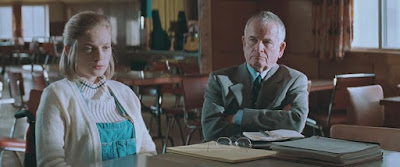1996, the best year in movie history, pt. 86: The sweet hereafter
The spiderbitten little girl peers up at her father as he rides with her to the hospital. With one hand, he calms her; with the other, he grasps a knife to cut her throat that she might breathe, that he might not lose her. The girl survives. She grows up and addicts herself to drugs. Her father effectively loses her anyway. He’d once hoped for happiness with his daughter (and with her mother, from whom he also is estranged).
He thinks of the girl as he travels to a remote British Columbian town. A lawyer, he is recruiting plaintiffs for a class-action suit regarding a deadly schoolbus accident. Courting each household in turn, he trots out tired arguments for holding someone accountable, preferably a deep-pocketed entity, a municipality or a corporation rather than an individual. The more nebulous the scapegoat, the more eagerly the victims’ parents join the suit. They’re angry at a universe that has frustrated their expectations for their children, for themselves. (Just one parent resists this way of thinking. He already has had to grieve for a dead wife.)
Movies about grief are the hardest to watch. This is a hard movie. There are passages of startling beauty – flashbacks. They are not comforting. The camera hovers over wintry mountains and rivers, tracking the school bus as it wends toward disaster. Children play. They sleep. A teenager sings sweetly. The memory of these things is not sweet. All is embittered by the knowledge of how these lives will end.
The most piteous character is the lawyer (Ian Holm). The dark implication of his story, if I interpret it correctly, is that losing one’s children is the norm. They needn’t die; alienation suffices. But then, who’ll pay? Whoever is left to pay. Spouses. Neighbors. One’s town. Those with whom one does business. Anyone. The universe. Harboring vengeful thoughts, one becomes the prey of those who traffic in vengeance. The traffickers themselves are in vengeance’s thrall. This is this lawyer’s affliction.
The movie doesn’t object to vengeance as such. One character obtains it, and perhaps rightly: the teenager who sings so sweetly. The actress, Sarah Polley, performs a remarkable about-face. She is winsome, then ice-cold.
Maimed but not killed in the accident, this girl obtains new clarity about the false hope and love that her father (Tom McCamus) instilled in her. She avenges herself on him – and on the town. Arguably, her victims deserve their punishment. We have seen the town’s loyal spouses and its cheats, its wonderful parents and its abusers, equally bent out of shape by grief, equally desirous to inflict damage on third parties. One suspects that they grieve as much for their own frustrated ambitions as for the loss of their children. He would have been a good man, one townsperson, a sympathetic figure, says of a particular dead boy. Maybe so, but this child’s goodness, his special worth to others, is beside the point. The death of the unattractive “slow” boy is just as grievous.
Grief’s piteous distortions on the mind were previously studied in director Atom Egoyan’s great Exotica (1994). The Sweet Hereafter (1997) is interested in these, and in communal distortions. The movie quotes Robert Browning’s “Pied Piper,” in which a selfish town’s children are lured away, leaving the adults bereft. The poem’s significance for the movie is a complicated question. (Egoyan adds lines of his own.) But one clue is that it’s a poem about a community, not just one parent or family. One’s children, one’s hopes, even one’s grief – these things are not one’s exclusive property. Everyone participates.




